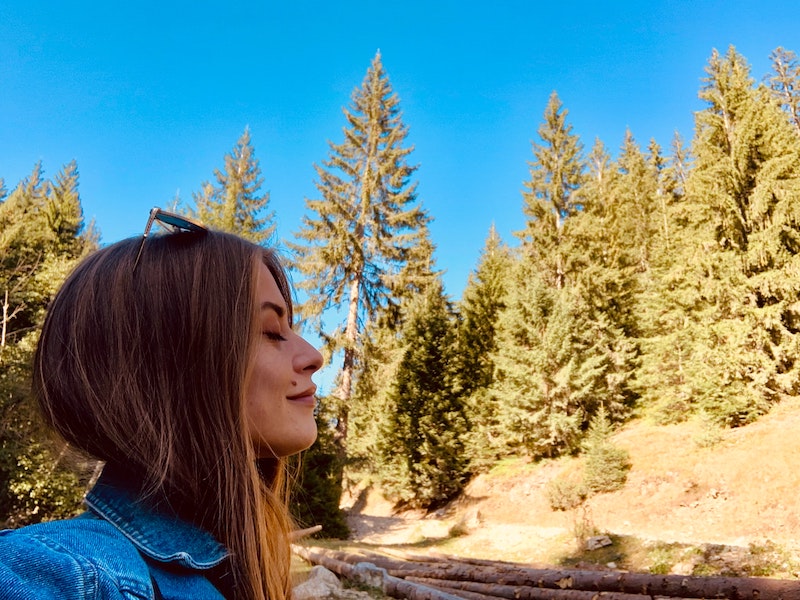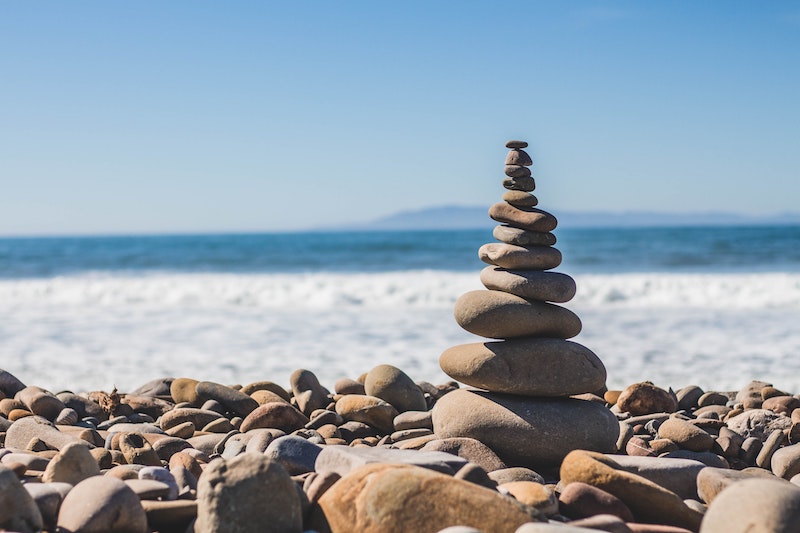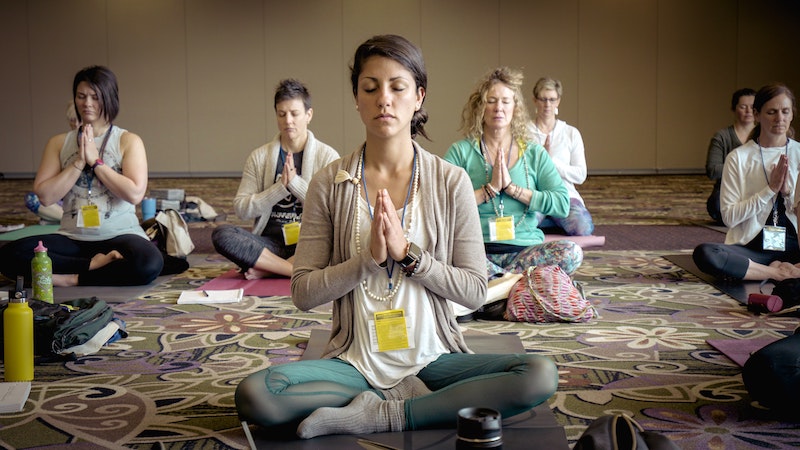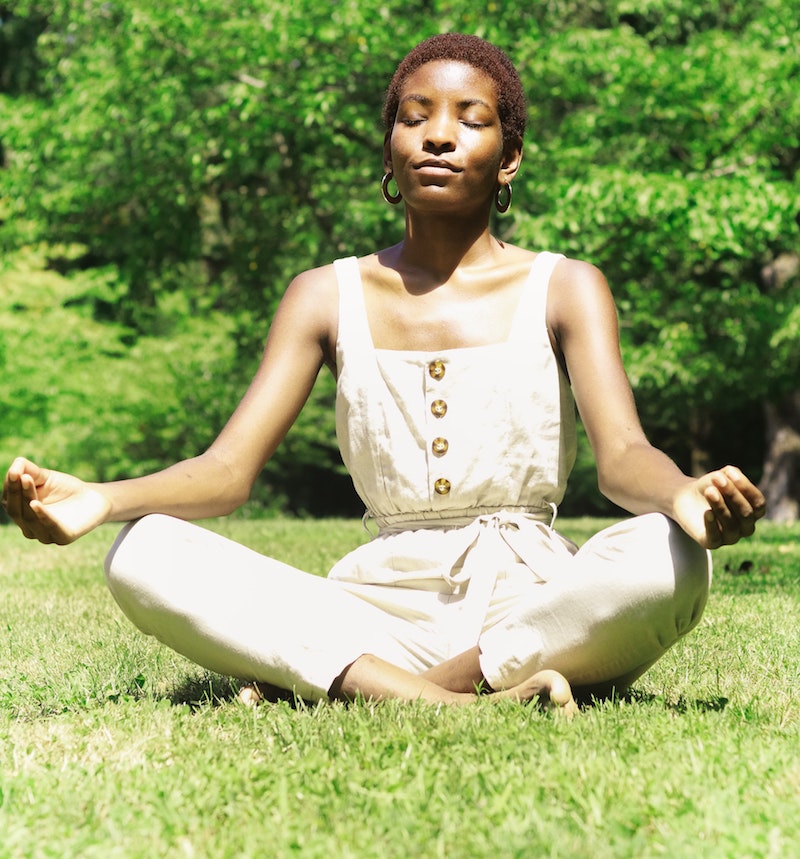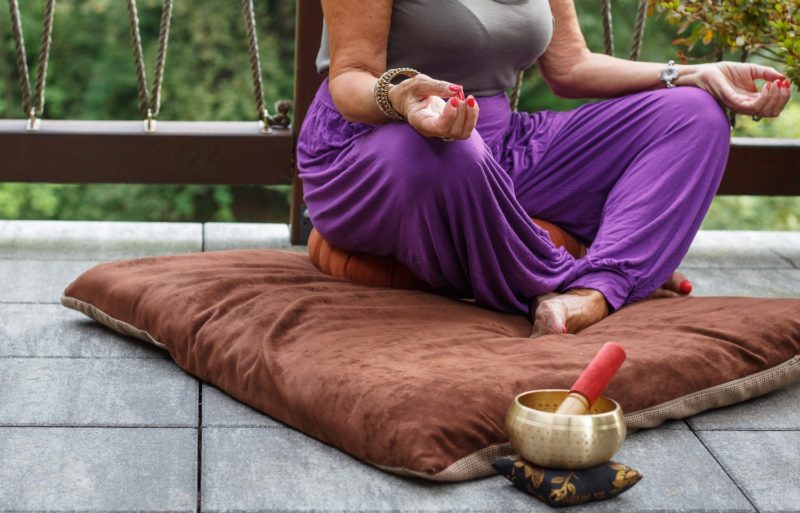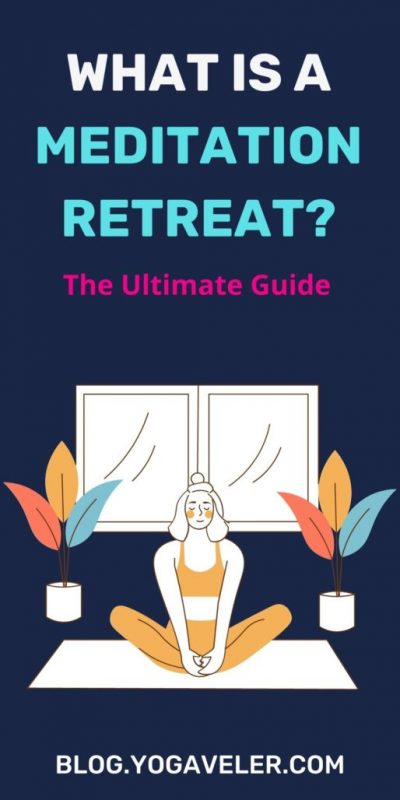What is a Meditation Retreat?
I was introduced to the idea of a meditation retreat soon after I joined a community of regular practitioners in a monastery close to my city. They would often talk about meditation retreats and I would always wonder – what is a meditation retreat.
A meditation retreat is a withdrawal from the activities of daily life to spend dedicated time at a place that is designed to support meditation practitioners in their practice. Most of the time on a meditation retreat is spent learning and practicing the techniques of meditation. It helps meditation practitioners build a strong foundation, navigate through their challenges, and cross the plateau in their practice if they have reached one.
Going on a meditation retreat is a deeply personal and unique experience, each so distinct from the other that it can never really be generalized.
That said, gaining an understanding of what happens on a meditation retreat, what are its benefits, when should you decide to go on one, what are the different kinds of meditation retreats, and what to expect from them, certainly helps us in both – our decision making and our time at the retreat.

What is a meditation retreat like?
A meditation retreat is a sanctuary for those who want to meditate. It is a refuge, a safe place that allows people to take a break from their daily lives and be in an environment that is in every way designed to facilitate a meditation practice.
Meditation retreats provide an immersive meditation experience. They are usually simple and modest places created with the objective of minimizing any distractions for a practitioner.
Depending on the format, you could be spending anything between a weekend or a couple weeks at a meditation retreat.
On a meditation retreat, there is more being and less doing. There is a focus on building awareness leading to insight. And there is an exploring of the many windows all of which open to the present moment.
Irrespective of the stage in which one is in their meditation practice, a meditation retreat enables stepping out of what is comfortable and leaving behind the familiar.
With no crutches to hold on to and no busy-ness to drown ourselves in, we are left to ourselves to feel, hold, and be held.
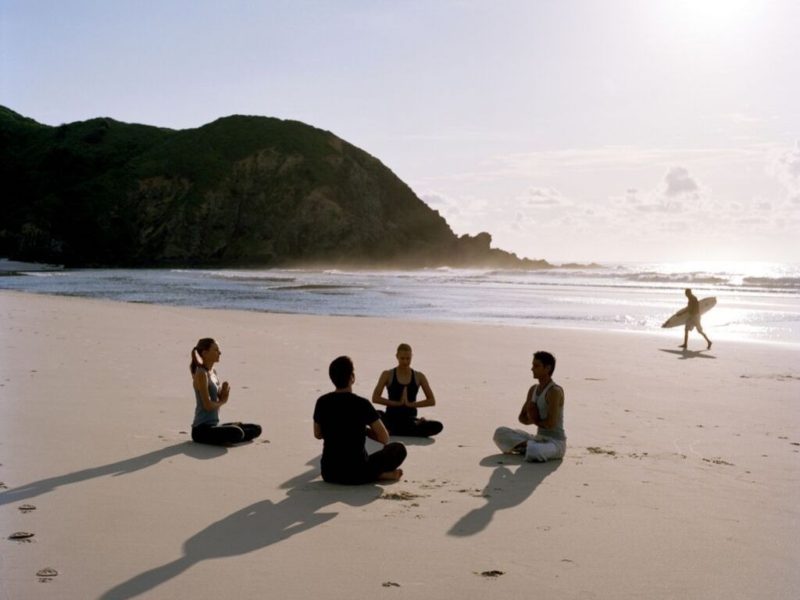
What are the benefits of a meditation retreat?
There are both tangible and intangible benefits of attending a meditation retreat. Spending time on a meditation retreat positively impacts all layers of our being, the physical, mental, emotional, and spiritual.
Benefits of a meditation retreat for the physical body
Our physical bodies are the first to benefit from moving to a positive environment.
Being away from duties that fill up our lives has an immediate effect of reducing stress levels and consequently, a decrease in blood pressure, improved blood circulation, and a healthier heart rate.
For those who have been experiencing chronic pain or are recovering from injury, there is an easing of the perception of pain, which again is a result of stress reduction.
Breathing into the body also helps to release accumulated tension, stress, and pain.
The routine of a meditation retreat improves sleep and helps to reset sleeping patterns. Relaxation and restorative practices also help in improving the quality of sleep.
Food that is provided on meditation retreats is ideal to detox the body. Eating light and healthy food helps to flush out toxins and the body also gets a break from caffeine, sugar, and alcohol.
Benefits of a meditation retreat for the mental body
The mental space available on a meditation retreat enables the mind to stop overworking and take a break.
Letting go of worldly duties to be in the ‘here and now’, is sometimes all it takes for stress levels to fall.
Being on a meditation retreat helps to take a breather from the state of the world.
The techniques made available on meditation retreats help to keep the mind in the present and prevent it from ruminating. This process creates a significant reduction in anxiety.
A meditation retreat also helps to re-train the mind. It enables letting go of negative habits by reinforcing a more positive and balanced approach to life and living.
It also enables building positive habits by resetting the body’s natural clock, food choices, and routine.
Benefits of a meditation retreat for the emotional body
Time spent on a meditation retreat is mostly alone. This time is emotionally therapeutic. It enables difficult emotions to surface which is the first step towards processing them and eventually making peace with them.
Most meditation retreats include practices and meditations on forgiveness and loving-kindness. These help in opening the heart and warming it to people and situations that we have so far been closed to.
Irrespective of how much interaction meditation retreats allow among participants, there is a feeling of coming together. Sharing the space and time with others and allowing them to witness our vulnerability builds connections that are meaningful and precious.
Benefits of a meditation retreat for the spiritual body
A guru has had great significance in yoga and meditation. Having a teacher or a guide to go to with questions that nag us, or just the knowledge that there is someone who we can ask for support when we need it, is enough to feel held. A meditation retreat provides that unconditional support.
There is an enhanced sense of self-awareness that comes from being on a meditation retreat. It could be about something as micro as why you hate your job or as macro as what is your purpose in life. Depending on your intent, a meditation retreat is a great place to find your answers.
What comes with time spent on a meditation retreat is the belief in the possibility of something that is much bigger than the timetable of daily life.
It gives faith in the worthiness of the discovery and the courage to keep forging ahead on our path.
Benefits of a meditation retreat for the spiritual body
A guru has had great significance in yoga and meditation.
Having a teacher or a guide to go to with questions that nag us, or just the knowledge that there is someone who we can ask for support when we need it, is enough to feel held.
A meditation retreat provides that unconditional support.
There is an enhanced sense of self-awareness that comes from being on a meditation retreat. It could be about something as micro as why you hate your job or as macro as what is your purpose in life. Depending on your intent, a meditation retreat is a great place to find your answers.
What comes with time spent on a meditation retreat is the belief in the possibility of something that is much bigger than the timetable of daily life.
It gives faith in the worthiness of the discovery and the courage to keep forging ahead on our path.
What is a typical day in a meditation retreat like?
If your question is about whether there will be any time in the day for daydreaming, well, not really. Here are the usual activities that fill up a day.
Sitting for long periods of time
A meditation retreat almost always involves many hours of sitting.
However, it is possible to find variety in the sitting. You could be sitting in meditation halls with other practitioners, sitting by yourself in your room, sitting with your breath, or sitting while you listen to a dharma talk. The emphasis is always on stillness.
Activities to support a meditation practice
Other than the meditation itself, some retreats have other activities that support a meditation practice – you could experience walks in nature, walking meditation, light yoga and breathing exercises, and working meditation also known as karma yoga or selfless service of helping out in the activities of the retreat.
Meeting with the teacher
There are opportunities to interact with the teacher, which is very helpful for getting answers to questions like ‘I keep falling asleep even while sitting without any back support’ or ‘It feels impossible for me to sit still even for a minute’.
A teacher can gently guide us when we feel stuck and show us the way when we are lost.
Spiritual talks
Depending upon the lineage of the meditation retreat, there are spiritual talks and discourses. These are intended to bring a practitioner closer to the roots of the practice.
It is believed that meditation should go hand in hand with the practitioner’s spiritual evolution. It is only through spiritual upliftment that the benefits of meditation can be truly realized. Spiritual talks during meditation retreats help with that.
Mindful meals
Meals have their own special place in a meditation retreat. Food is almost always vegetarian, light, local, freshly cooked, and healthy, which supports the practice of meditation. Meals are supposed to be both prepared and consumed mindfully.
What are the different types of meditation retreats?
The lineage of the meditation retreat will determine the style of meditation you will be practicing. Here are the most widely practiced meditation styles:
Silent meditation retreat
In a silent meditation retreat, a practitioner observes a vow of silence. Any communication with the other participants and the outside world is disallowed, including non-verbal communication like eye contact or gestures.
Vipassana is the best example of a silent meditation retreat. With centers around the world, it is one of the oldest forms of meditation. It also has one of the strictest codes of conduct – no reading, writing, journaling, or engaging in personal physical or spiritual practices.
Here’s a big guide that talks about why you need to know about Silent Meditation Retreat.
Buddhist meditation retreat
Meditation in Buddhism is practiced to attain the ultimate goal of spiritual liberation.
Buddhist meditation retreats are based on the teachings and practices of meditation in Buddhism. They are humble and create an experience that is close to ascetic.
Because of the diversity in Buddhism, a Buddhist meditation retreat could include one or more techniques of meditation like loving-kindness and compassion meditation, walking meditation, reflections to develop insight, and breath meditation.
Mindfulness meditation retreat
Mindfulness meditation retreats aim to create awareness of the body and mind. They help train the mind to be in the present, let go of overthinking and negative thoughts, and acknowledge feelings and emotions as they are, without judgment.
These retreats are wonderful to process difficult emotions and experiences.
They help in developing what is called a ‘witness like attitude’ where thoughts and feelings are seen for what they are – fleeting and impermanent.
What to expect from a meditation retreat?
Given how different each experience of a meditation retreat can be, it is best to not expect anything. But if you must, expect both highs and lows.
There is the possible euphoria that comes with a deep meditative experience or achieving a breakthrough in one’s practice.
Since being on a meditation retreat is not very easy, getting through one helps to build more self-belief and self-reliance.
The lows are actually highs in disguise.
Different emotions inevitably come up when we are by ourselves, without our usual coping mechanisms. We cannot distract ourselves, talk our way out, indulge in food, or binge-watch sitcoms.
There is no escape. The captivity is cathartic. It helps us purge and shed the emotional loads we have been carrying.
Meditation will not carry you to another world, but it will reveal the most profound and awesome dimensions of the world in which you already live. Calmly contemplating these dimensions and bringing them into the service of compassion and kindness is the right way to make rapid gains in meditation as well as in life.” – Zen Master Hsing Yun
Some frequently asked questions on meditation retreats
A quick round-up of everything about meditation retreats.
It could be free. For instance, Vipassana meditation retreats, the most established and well-known silent retreats in the world, are run through donations and do not charge participants any money, not even for food or accommodation.
On the other end, a meditation retreat can also be an expensive affair, up to $3000 for a one-week luxury meditation retreat.
The cheaper ones are simple, modest, and humble, while the more expensive ones provide a more luxurious experience.
Lorem ipsum dolor sit amet, consectetur adipiscing elit. Ut elit tellus, luctua
There is enough and more variety when it comes to the duration of meditation retreats.
You could find the ones that run for a day or over a weekend. Then there are retreats with standard programs of ten days. There are also retreats that last for 45 days to 2 months. And there is everything in between.
s nec ullamcorper mattis, pulvinar dapibus leo.
Unless it is specifically mentioned, most meditation retreats are planned and designed keeping beginners in mind.
Also because the practices taught could be very different from one retreat to the other, there is never really an assumption that participants would arrive with prior knowledge and experience.
However, it does help to be physically and mentally prepared so that you can be present with your mind and your body throughout the duration of the retreat.
👉 Learn more about the 13 benefits of meditation retreats for beginners by clicking this link.
That answer usually comes from trial and error. There is no one road to salvation. Sometimes it takes trying out a few practices to know which one you align best with.
However, if you have been practicing a certain form of meditation and would like to go deeper into that, going on a meditation retreat of the same lineage is a great way to do that.
Not necessarily but preferably. While people do go to meditation retreats with partners or friends, if you feel that that could be a distraction for you even in the smallest of ways, choose solo.
The whole purpose of a meditation retreat is to be with yourself. Make the most of that opportunity.
Concluding thoughts
A meditation retreat helps us move away from distractions and move toward our true selves.
While it keeps us away from the world, it also deepens our connection with the world by helping us feel more in touch with everything that’s around us.
A meditation retreat teaches us to be with ourselves, understand ourselves, and love ourselves. In the end, that’s all that matters.
If you have any experiences from your time at a meditation retreat or any questions that you would like answers to, please share them with us in the comments below.
Did you find this post useful? Save THIS PIN below to your Pinterest Meditation board on Pinterest for later!


